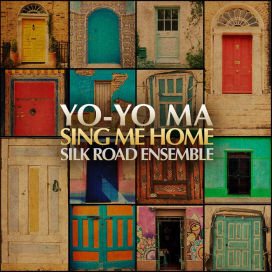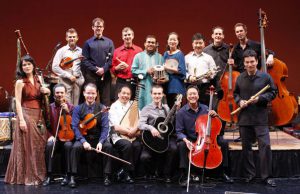Yo-Yo-Ma's Silk Road Ensemble Goes Off-roading
Podcast: Play in new window | Download
Subscribe: RSS
Listen to the interview with Yo-Yo Ma above, or download it from iTunes.
 The Music of Strangers: Yo-Yo Ma & the Silk Road Ensemble opens June 10.
The Music of Strangers: Yo-Yo Ma & the Silk Road Ensemble opens June 10.
Cellist Yo-Yo Ma’s Silk Road Ensemble is in its 16th year and its music horizons just keep getting broader. Their new album, Sing Me Home, features guest performances by guitarist Bill Frisell, banjoist Abigail Washburn, African kora players Toumani Diabate, Balla Kouyate and among eight others musicians from around the world. In addition, there is a new documentary, “The Music of Strangers: Yo-Yo Ma and The Silk Road Ensemble,” directed by Morgan Neville who won an Oscar for his film, “20 Feet From Stardom.” I get a few feet from a different kind of stardom with Yo-Yo Ma, Kinan Azmeh, Johnny Gandelsman and Wu Man of the Silk Road Ensemble.
Chinese pipa player Wu Man is a charter member of the Silk Road Ensemble. She was with Yo-Yo Ma in the planning stages in the late 1990s and continues with the group to this day. She says the project has evolved from its roots in the East.
“The project actually is slowly in a different phase now, a different stage,” Wu Man observes. “In the early years were more centered on world music, more concentrated around the Silk Road countries. We have quite a number of central Asia musicians with us. Gradually I think the project, and Yo-Yo himself, realized we basically use the Silk Road idea as a metaphor to expand more.”
The Silk Road Ensemble has veered considerably off the trail on their new album, Sing Me Home. For the first time, American folk music is represented with singer Rhiannen Giddens and banjoist Abigail Washburn.
“It ranges from having a traditional folk song, like Little Birdie, that was made famous by Pete Seeger, to St. James Infirmary,” Johnny Gandelsman discloses. The Russian born violinis is also the producer of the Silk Road Ensemble. “But in our version it’s combined with this incredibly thrilling music of the Roma people, the gypsies from Romania.”
The Silk Road Ensemble doesn’t just play folk songs or classical works from other countries. They merge these cultures together, creating fusions that would’ve taken centuries to develop at the height of the actual Silk Road, but the Silk Road Ensemble makes these connections in moments.
“We’re multi-sensate beings,” conveys Yo-Yo Ma. “And we like to be able to feel and touch things that actually remind us of things that make us connect to people and make us connect to the world around us and not just build walls, for example.”
Nowhere is that more apparent than the opening track “Green.” It started with a motif written by Wu Man, but then, goes somewhere else. “That track actually sets up the album really well,” boasts Gandelsman, “because it starts with this beautiful solo on one of the most beautiful instruments in the world, the Bawu, which is a Chinese bamboo flute. “It’s very beautiful and it’s very serene, and then over the course of the track it turns. The track transforms into this driving groove-based party. I think it kind of throws the expectations of another nice, world music album. It transforms those expectations and throws them out the window.” By the end of “Green,” it sounds like a world music noise band.
The central musicians in the Silk Road Ensemble come from a variety of backgrounds although most of them have classical training either from the West or in the music from their home countries. Kinan Azmeh was born in Syria and his initial music was classical. “The clarinet for some reason never traveled south of Turkey,’ explains Azmeh, “so it doesn’t exist in the Arabic music tradition, but my dad is an avid listener of Western classical music. My mom was more into Arabic traditional music, so I grew up listening to both, but my education, the actual education was, was all classical music. I was trained as a classical clarinetist, so the music I learned growing up was Mozart, Webern and all these, a quite limited kind of repertoire. But I was introduced to the idea of improvisation at an early age. Improvisation plays into his composition, “Wedding,” which is part of his suite for improviser and orchestra.
Yo-Yo Ma says that the civil war ravaging his native Syria ways heavy on Azmeh. “Kinan talks about people falling in love in times of great crisis and he dedicates ‘Wedding’ to those people that are falling in love during these horrible five years,” says Ma. “That’s a human right.”
One dramatic change in the group is the presence of Christina Pato from Galicia, Spain. She plays a bagpipe called the gaita, bringing a different energy to the group. “She does, yes,” Yo-Yo Ma laughs, with perhaps a hint gentlemanly lasciviousness. “When she first played with us, we played a piece by Osvaldo Golijov and my god, she was rockstar. She’s in a girl band, she’s very pretty and she’s a very sensual person. It was the first time we played this Roma piece that Osvaldo had written, and she’s basically doing a big improvisation between chords.”
For all their virtuosity, the Silk Road Ensemble embraces even the most primitive sound. In the film, “The Music of Strangers,” there is a scene with the Zhang family in China. They’re playing all kinds of rustic traditional instruments and one musician is keeping the rhythm by slamming a block of wood into a scarred wooden bench.
“Music is not about expensive instruments,” declares Yo-Yo Ma. “Music is about expressing what you need to express and people will always find a way to express because that’s a human right,”
Yo-Yo Ma had to break out of his own tradition to create the Silk Road Ensemble, and so did every other musician in the group. “Creativity happens at the margins,” declares Yo-Yo Ma. “It’s very hard to innovate from the center. The new stuff that’s coming out in knowledge is often when different disciplines start to cross and to know each other.”
The latest album from Yo-Yo Ma and the Silk Road Ensemble is Sing Me Home on Sony Masterworks. It’s accompanied by the documentary film, “The Music of Strangers,” distributed by The Orchard. It’s in theaters now and will be released on HBO later this year.


Love this. Yo Yo helps keep interesting music alive